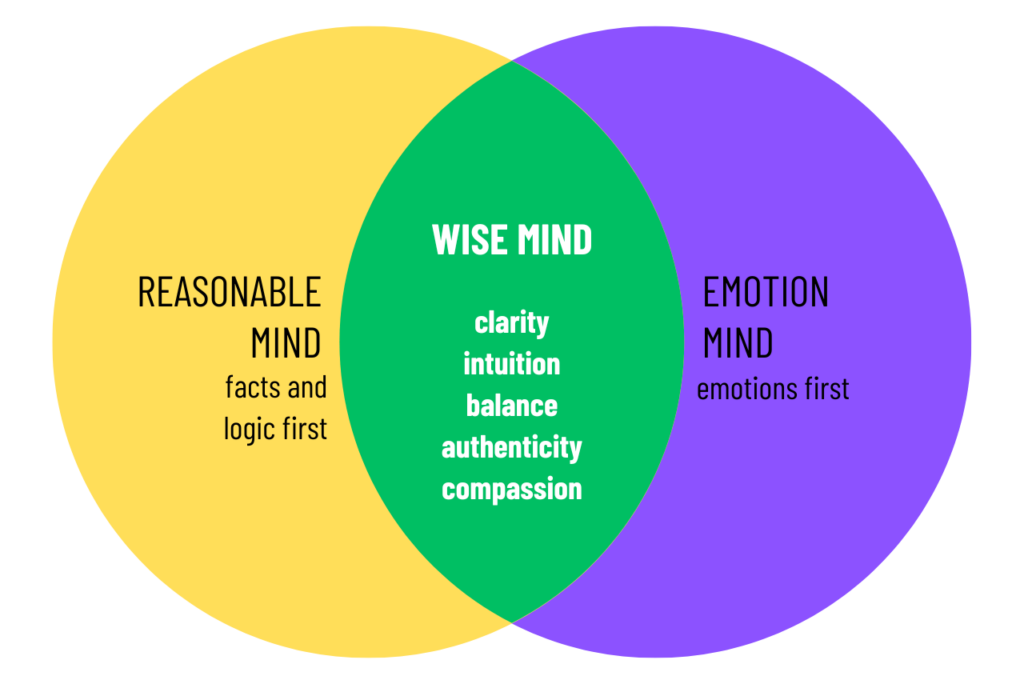Wise Mind combines and balances the emotional and the rational
The WISE MIND technique is a core aspect of DBT. It is based on the concept of the three states of mind: emotion mind, reasonable mind, and wise mind. The wise mind is the optimal state where rational thinking and emotions come together. It allows individuals to make sound decisions that align with their values and goals. The WISE MIND technique is used to help individuals access and strengthen their wise mind, particularly during times of emotional distress or impulsive behavior. It involves mindfulness exercises, such as observing, describing, and participating fully in the present moment.

Understanding the Wise Mind
Definition and explanation of the Wise Mind concept
The Wise Mind is a concept in DBT that refers to an optimal state of mind where rational thinking and emotions come together. It is the state in which individuals can make sound decisions that align with their values and goals. The Wise Mind allows for a balanced approach to problem-solving and decision-making, taking into account both logical reasoning and emotional intuition.
Characteristics and qualities of the Wise Mind
The Wise Mind is characterized by several qualities, including:
- Clarity: The ability to see situations clearly and objectively, without being overwhelmed by strong emotions.
- Intuition: A deep understanding and insight that comes from within, guiding individuals towards wise and appropriate actions.
- Balance: The Wise Mind incorporates both emotional and rational aspects, finding the middle ground between impulsive reactions and detached analysis.
- Authenticity: It encourages individuals to act in alignment with their authentic selves and values, rather than being swayed by external influences.
- Compassion: The Wise Mind fosters empathy and compassion towards oneself and others, promoting understanding and acceptance.
By cultivating the Wise Mind, individuals can navigate challenges and make decisions that lead to personal growth and well-being.
The Integration of Reasonable Mind and Emotional Mind
Exploring Reasonable Mind and Emotional Mind in DBT
The Wise Mind concept in DBT emphasizes the integration of Reasonable Mind and Emotional Mind. Reasonable Mind refers to the logical and analytical aspect of thinking, while Emotional Mind represents the emotional and intuitive aspect. By integrating these two minds, individuals can make decisions that consider both rationality and emotion.
The importance of balancing and integrating both minds
Balancing and integrating Reasonable Mind and Emotional Mind is crucial for effective decision-making and problem-solving. Purely relying on logic may result in detached and robotic actions, while solely relying on emotions may lead to impulsive and irrational decisions. The integration of both minds allows for a holistic approach, ensuring that decisions align with personal values and goals while also considering emotional well-being. By finding a balance between reason and emotion, individuals can cultivate the Wise Mind and make wise, authentic choices.
Cultivating Mindfulness
Practicing mindfulness as a foundation for accessing the Wise Mind
Mindfulness plays a key role in accessing the Wise Mind. It involves paying attention to the present moment and accepting it without judgment. By cultivating mindfulness, individuals can become more aware of their thoughts, feelings, and bodily sensations. This awareness creates a space for observing both Reasonable Mind and Emotional Mind, allowing for the integration of both. Mindfulness practice serves as a foundation for accessing the Wise Mind and making balanced decisions.
Mindfulness techniques and exercises
There are various mindfulness techniques and exercises that can be used to cultivate mindfulness. These include:
- Deep breathing exercises: Taking slow, deep breaths to focus on the present moment and bring attention back to the present.
- Body scan meditation: Slowly scanning the body from head to toe, paying attention to any sensations or areas of tension.
- Mindful eating: Paying close attention to the taste, texture, and sensations of each bite of food.
- Loving-kindness meditation: Cultivating feelings of love, compassion, and kindness towards oneself and others.
By incorporating these mindfulness techniques and exercises into daily life, individuals can strengthen their ability to access the Wise Mind and make well-balanced decisions.
Nonjudgmental Observation
Learning to observe and accept thoughts and emotions without judgment
In the practice of nonjudgmental observation, individuals learn to become aware of their thoughts and emotions without labeling them as good or bad. By observing these thoughts and emotions without judgment, individuals can gain a deeper understanding of themselves and their experiences. This practice reduces self-criticism and promotes self-compassion, allowing individuals to approach their inner world with acceptance and kindness.
Reducing self-criticism and increasing self-compassion
Nonjudgmental observation is a powerful tool for reducing self-criticism. Instead of berating ourselves for our thoughts and emotions, we learn to acknowledge them without judgment. This practice fosters self-compassion, which involves treating ourselves with kindness and understanding. By cultivating self-compassion, individuals can develop a more nurturing and supportive relationship with themselves, allowing for personal growth and emotional well-being.
Wise Mind Decision-Making
Using the Wise Mind to make effective and balanced decisions
In the practice of Wise Mind decision-making, individuals aim to find a balance between logical reasoning and emotional intuition. By tapping into the Wise Mind, which combines both the rational and emotional aspects of thinking, individuals can make decisions that are grounded in both facts and personal values. This approach allows for effective decision-making that considers both the practical implications and the emotional impact of choices.
Applying the TIP (Take a step back, Identify options, Pick a pros and cons list) method
The TIP method is a practical tool to support Wise Mind decision-making. It involves taking a step back from the situation, identifying different options, and creating a pros and cons list for each option. This method encourages individuals to analyze the potential benefits and drawbacks of each choice, helping them make informed and well-rounded decisions. By systematically considering different perspectives and possibilities, individuals can navigate decision-making with clarity and confidence.
Applying Wise Mind in Daily Life
Practical tips for incorporating the Wise Mind technique in daily life
- Practice mindfulness meditation regularly to cultivate awareness of the present moment and to connect with your emotions.
- Take time each day to reflect on your thoughts and feelings, and to identify any areas where logic and emotions may be in conflict.
- Use journaling as a tool to explore and understand your emotions, and to gain clarity on the factors influencing your decision-making.
- Seek out trusted friends or mentors for advice and different perspectives on your decisions, while remaining true to your own values.
- Understand that Wise Mind decision-making is a process, and that it may take time and practice to fully integrate this technique into your daily life.
Dealing with challenging situations and emotional triggers
- When faced with a challenging situation, pause and take a step back to allow space for clarity and wise judgment to emerge.
- Identify any emotional triggers that may be influencing your decision-making and take the time to explore their underlying causes.
- Use grounding techniques, such as deep breathing or focusing on your senses, to help bring yourself back to the present moment and regulate your emotions.
- Practice self-compassion and acknowledge that it is okay to make mistakes or experience uncertainty during the decision-making process.
- Seek support from a therapist or counselor if you find it challenging to navigate challenging situations or emotional triggers on your own.
Benefits and Limitations of the WISE MIND Technique
Exploring the advantages and potential limitations of the Wise Mind technique
The Wise Mind technique offers several benefits for individuals seeking to enhance their decision-making process and navigate challenging situations with clarity and emotional regulation. Some advantages include:
- Increased self-awareness: Practicing mindfulness meditation and reflecting on thoughts and emotions allows individuals to deepen their understanding of themselves and their internal experiences.
- Integrating logic and emotions: The Wise Mind technique promotes a balance between rational thinking and emotional intelligence, allowing individuals to make decisions that align with both their values and their emotions.
- Expanded perspectives: Seeking advice from trusted friends or mentors provides valuable insights and alternative perspectives, helping individuals make well-rounded decisions.
However, it’s important to recognize the limitations of the Wise Mind technique. Some potential limitations include:
- Time and practice required: Fully integrating Wise Mind decision-making into daily life may take time and consistent practice. It may not be an immediate solution for complex decision-making situations.
- Individual differences: Each person’s Wise Mind may be unique, as it is influenced by personal values, beliefs, and experiences. What works for one individual may not work for another.
- Need for additional support: While the Wise Mind technique can be helpful, it may not be sufficient for everyone. Seeking professional support from therapists or counselors can be beneficial when facing challenging situations or emotional triggers.
Find out more about DBT and how it works at the Resource Group.
Real-life examples of how the technique can be beneficial
The Wise Mind technique can be applied in various real-life scenarios with favorable outcomes. Some examples include:
- Making career decisions: By combining logical reasoning with emotional intuition, individuals can make career choices that align with their passions and values, leading to greater job satisfaction.
- Resolving conflicts in relationships: The Wise Mind technique can assist in understanding one’s emotions and empathizing with others, enabling more compassionate and effective communication during conflicts.
- Managing stress and anxiety: By cultivating mindful awareness and regulating emotions, individuals can reduce stress and anxiety levels, improving overall well-being.
The Wise Mind technique offers numerous benefits and can be a valuable tool for decision-making and emotional regulation. However, it is important to recognize its limitations and the need for individualized approaches and additional support in certain situations. Contact us today to schedule an appointment.






